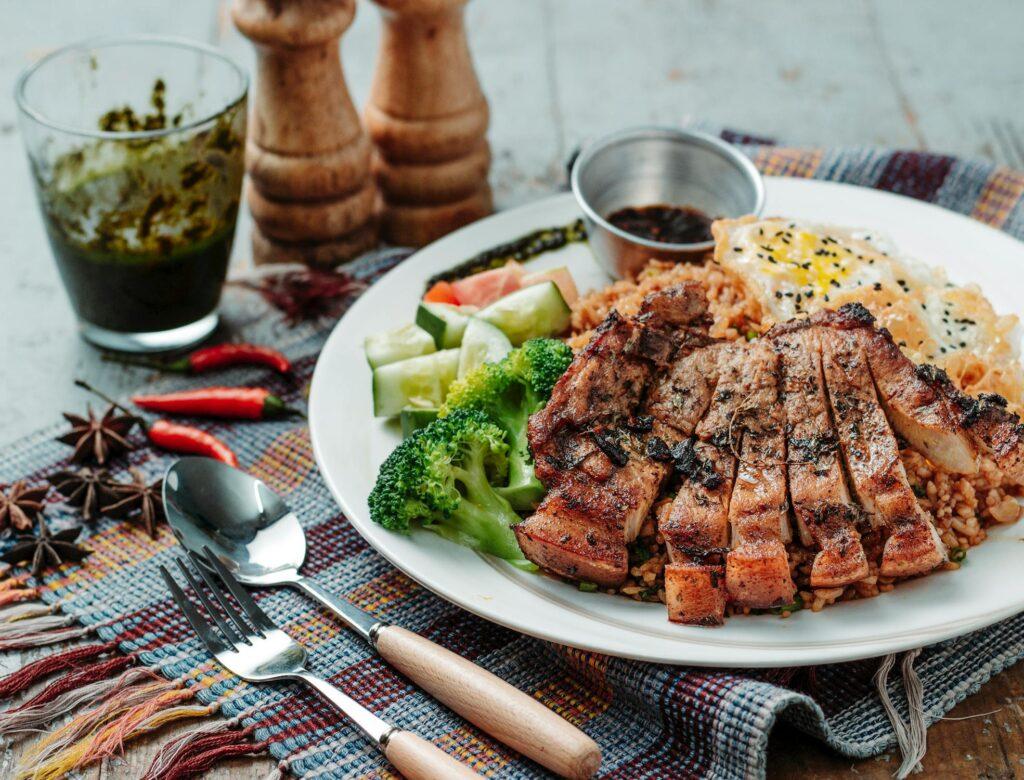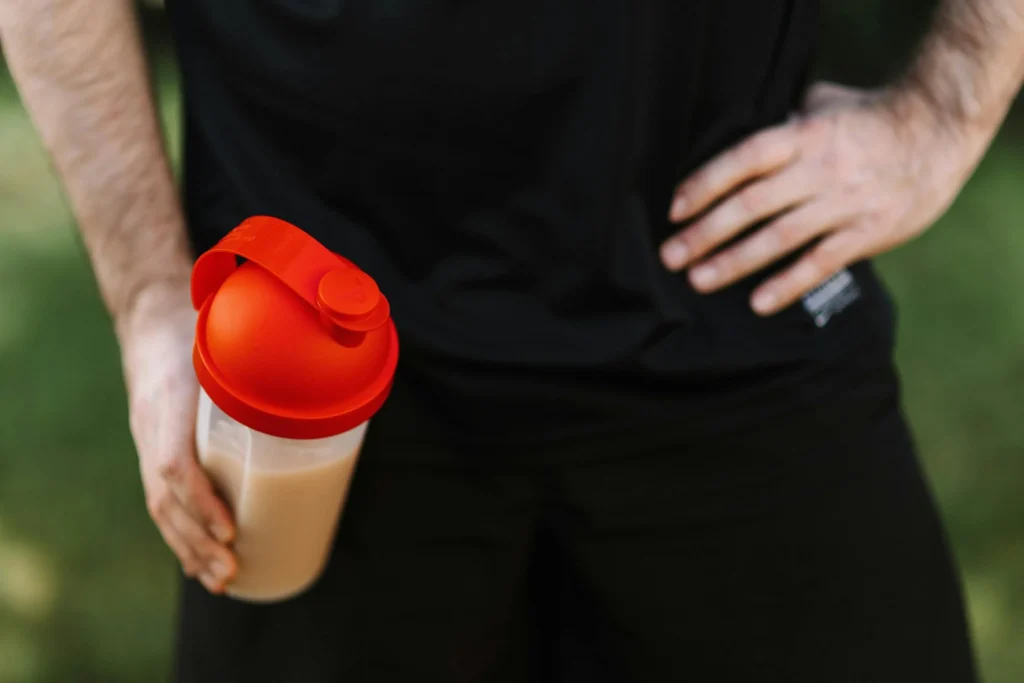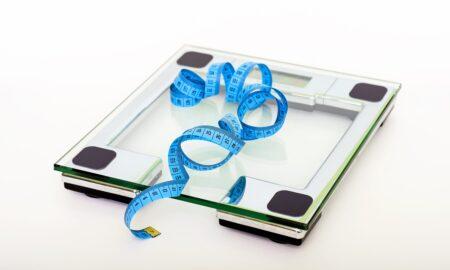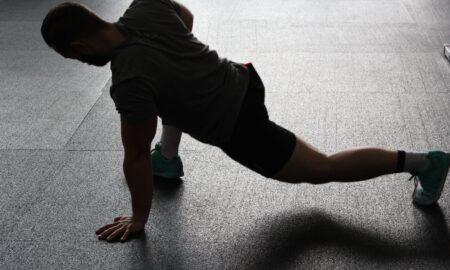

Bulking for bodybuilders involves consuming a surplus of calories to support muscle growth while engaging in resistance training. Bulking isn’t just about consuming any calories you can get your hands on. It requires a well-thought-out dietary plan that prioritizes nutrient-dense foods to fuel muscle growth while minimizing fat gain.
To maximize muscle gain and minimize fat accumulation, this article goes over key principles of nutrition for bulking, including macronutrient ratios, meal timing, and supplementation strategies to optimize your bulking phase.
What is Bulking?
Bulking is consuming more calories than you expend or exceeding your body’s needs, along with intense heavy lifting to gain muscle mass.
The excess calories keep the body in a surplus calorie balance. When the body is in a calorie surplus mode, it enters an anabolic growth state, which promotes muscle growth.
Bulking is mainly done in bodybuilding within a set period, often four to six months. You don’t have to be a bodybuilder to try it! It can be helpful for anyone looking to gain size cleanly. It promotes the growth of lean muscle mass, and the extra calories in bulking fuel the training performance and increase strength.
How Many Calories Should I Consume When Bulking?
The amount of calories one consumes varies from person to person and depends on factors like weight, exercise intensity, age, and height.
You can use an online bulking calorie calculator to find the number of calories you need to bulk. After keying in some basic information, such as your height, age, and goal weight, the calculator will determine the number of calories you need to consume daily.
During the bulking phase, experts suggest consuming 10-20% more calories than your daily weight maintenance requirements to achieve an average weekly weight gain of 0.25% – 0.5% of your body weight.
To calculate maintenance calorie requirements, use a total daily energy expenditure calculator. TDEE is the measure of the amount of calories you need daily to support your body’s optimum function.
After determining the TDEE, calculate 10% or 20% of your TDEE and add to it to get the calories needed for bulking.
Determining Macronutrient Ratio for Bulking
Once you’ve determined the calories required for bulking, it’s important to know what these calories consist of— the exact macronutrients and the amount needed.
The body requires high amounts of three macronutrients—carbohydrates, protein, and fats.
Carbohydrates are the body’s primary energy source, particularly during intense exercise. When consumed, the body breaks them down to replenish the glycogen stores, creating energy for exercising.
Carbohydrates also support bulking by preventing the breakdown of protein that can be used as an energy source. When carbohydrates are insufficient, the body may break down protein, the building block for muscle tissue, for energy. This is counterproductive for muscle growth and maintenance. By providing a quick and readily available energy source, carbohydrates help preserve muscle mass and promote muscle growth.
Protein is the building block for protein. When your muscles tear due to intense exercise, adequate protein provides the amino acids necessary for rebuilding and developing new muscles.
Protein has a higher thermic effect than carbohydrates and fats, requiring more energy to digest, absorb, and metabolize. This increases calorie expenditure, supporting a higher metabolic rate during bulking.
Healthy fats help produce hormones, like testosterone, that support muscle growth and repair. When your fat is below the required minimum of 15%, it negatively affects hormone levels, disrupting muscle building during bulking.
Fats contain 9 calories per gram, serving as a concentrated energy source. It can fuel high-intensity workouts and support overall energy levels during a bulking phase, especially when carbohydrate intake is moderate or lower to avoid excessive fat gain.
Experts suggest bodybuilders should get the following percentage during the bulking phase
- 55–60% calories from carbohydrates
- 25–30% calories from protein
- 15–30% calories from fat
Once you’ve determined your daily macro intake, distribute the amount of each macronutrient evenly across your mealtimes, often four to six meals a day or evenly across your pre-workout, intra-workout, and post-workout meals.
For instance, if you need 540g of carbs, 270g of protein, and 120 g of fats, your daily calorie intake for six meals would be 90g of carbs, 45 grams of protein, and 20 grams of fat.
If you’re new to bodybuilding and have less than six months of weightlifting experience, aim for the higher calorie intake range. Experienced bodybuilders should aim for the lower limit to prevent fat gain.
Keep tracking your weight gain 2-3 times a week. Compare your weekly weight gain with your goal, which should be a weight gain of 0.25% –0.5% of your body weight per week.
If you are gaining weight below or above the weekly requirement, add 10% of your current daily calories to your current calorie intake.

Bulking Nutrition: What to Eat and Avoid
There are two ways of bulking: Clean or lean bulking, which involves filling up on healthy meals that lead to lean muscle mass, and dirty bulking, which is filling in your calories with junk food, leading to more fat gain than muscle gain.
Bulking requires proper nutrition. If your calorie or macros are unsuitable, you’ll gain more body fat instead of lean muscle mass. To support a healthy, clean bulking, here are foods you should consider eating.
They include:
1. High Protein Foods
Chicken breast: Chicken breast is a high protein source that provides over 20 grams of protein per three ounces and has a relatively low-fat content. It also provides essential amino acids needed for muscle repair and growth.
Salmon: Salmon fish are rich in omega-3 fatty acids and high-quality protein. They support muscle recovery, reduce inflammation, and promote overall health. Opt for wild-caught salmon for maximum nutritional benefits.
Eggs: Whole eggs are an excellent source of complete protein, vitamins, and minerals, such as choline and vitamin D, which are crucial for muscle function.
Yogurt, Cheese, and Milk: Dairy products contain a high protein content, essential minerals like calcium, and vitamins that support bulking.
Lean beef: Beef is rich in protein, fat, iron, zinc, and B vitamins, making it a valuable addition to a bulking diet. Opt for lean cuts like sirloin or tenderloin to minimize saturated fat intake.
2. Carbohydrate-Rich Foods
Oats: are a complex carbohydrate that provides a steady release of energy, making them an ideal choice for sustained workouts and muscle recovery.
Brown rice: is a source of complex carbohydrates, vitamins, and minerals. The carbohydrates provide energy to fuel workouts and support muscle glycogen replenishment.
Sweet Potatoes: are a nutrient-dense carbohydrate rich in vitamins, minerals, and fiber. They provide sustained energy and help replenish glycogen stores after intense workouts.
Quinoa: is a complete protein source with complex carbohydrates, making it a valuable addition to a bulking diet.
Whole wheat bread: provides quick and easy carbs. Opt for whole wheat bread over refined white bread to increase fiber intake and support sustained energy levels throughout the day.
Vegetables: Beans, lentils, chickpeas, Broccoli, cauliflower, Brussels sprouts.
Fruits: Bananas, berries, apples, oranges, mangos.
3. Fat Rich Foods
Avocados: provide a concentrated source of calories and nutrients, making them ideal for adding healthy fats to a bulking diet. They are rich in healthy monounsaturated fats, vitamins, and minerals.
Nuts and Seeds: Almonds, walnuts, chia seeds, and flaxseeds are nutritious sources of healthy fats, protein, and fiber. They also contain vital micronutrients and minerals like zinc, phosphorous, selenium, and magnesium, which can maintain and support clean bulking.
Olive Oil: Extra virgin olive oil is rich in healthy fats and antioxidants. Cook with or drizzle it over salads and vegetables to increase calorie intake and promote satiety. It is mainly used in the Mediterranean diet.

4. Supplements
You should try and get as many of your nutrients from food. But since you need a lot of calories when bulking, getting them primarily from foods can be challenging. Supplements can be useful for filling in nutrient gaps or enhancing specific aspects of your bulking regimen.
Below are three scientifically proven supplements that can support clean bulking.
They include:
1. Protein Powders
Protein powders, such as whey protein, casein protein, and plant-based protein powders, can help you meet your daily calorie intake requirement. They contain high-quality protein vital for muscle growth.
When buying a protein powder, choose the one with a high concentration of amino acids and no added sugar. Amino acids help repair damaged muscle tissue and promote faster recovery between workouts. They are also the building blocks of protein, which is vital for muscle growth.
Incorporate them into shakes, smoothies, oatmeal, yogurt, or baked goods to boost protein intake.
2. Creatine
Creatine provides the muscles with additional energy during high-intensity exercise. Supplementing with creatine, particularly creatine monohydrate, has been shown to improve strength, power, and performance during high-intensity, short-duration activities like weightlifting and sprinting.
By improving workout performance and increasing training volume, creatine supplementation may indirectly support muscle growth during the bulking phase.
Foods to Avoid When Bulking
When bulking, it’s essential to prioritize foods that support muscle growth and provide the necessary energy for intense workouts. However, some foods might not be ideal for bulking because they are high in unhealthy fats and sugars or provide little nutritional value relative to their calorie content.
Here are some foods to avoid or limit when bulking:
Processed Foods: Foods like chips, cookies, cakes, and sugary cereals are often high in added sugars and unhealthy fats and low in nutrients. They can contribute excess calories without providing much nutrition.
Sugary Drinks: Beverages like soda, sweetened juices, and energy drinks are loaded with added sugars and calories but offer little nutritional value. Opt for water, milk, or natural fruit juices instead.
Fried Foods: Fried foods like french fries, fried chicken, and fried snacks are high in unhealthy fats and calories. Instead, choose grilled, baked, or steamed options for your protein and vegetables.
Excessive Alcohol: Alcohol can interfere with muscle growth and recovery by affecting hormone levels and impairing nutrient absorption. Limit alcohol consumption, especially during periods of intense training.
Conclusion
Crafting the perfect diet for bulking requires careful consideration of nutritional choices to support muscle growth while minimizing excess fat gain.
Prioritizing whole, nutrient-dense foods, such as lean proteins, complex carbohydrates, healthy fats, fruits, and vegetables, can provide your body with the necessary fuel for intense workouts and optimal recovery.
Avoiding or limiting processed foods, sugary snacks, and excessive alcohol can further optimize your bulking journey.
Above all, consistency is the key to achieving mass-building. Start by making small, sustainable changes to your diet and stay committed to your nutrition plan. With dedication and the right fuel, you’ll be well on your way to achieving the gains you desire.
Take action today and fuel your body for success!






















You must be logged in to post a comment Login